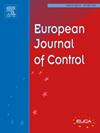Distributed optimal nonlinear dynamic inversion for multi-agents consensus
IF 2.6
3区 计算机科学
Q2 AUTOMATION & CONTROL SYSTEMS
引用次数: 0
Abstract
In this paper, we propose an optimal distributed controller based on Nonlinear Dynamic Inversion (NDI) theory and apply it to solve the consensus of nonlinear multi-agent systems (MASs). Our proposed method addresses the limitations of existing Distributed Nonlinear Dynamic Inversion (DNDI) techniques, which only apply to agents with square output. We formulated an optimal control problem to minimize a quadratic cost function while satisfying a set of linear constraints derived by simplifying the enforced consensus error dynamics. By relaxing the previous limitation, we introduced a distributed optimal framework called Distributed Optimal NDI (DONDI). This framework achieves consensus and incorporates additional objectives, such as minimizing control energy. The design of Optimal DNDI inherits all the advantages of NDI and provides an optimized allocation of control for achieving consensus in MAS. Also, we have shown how the controller handles the communication noise. This approach represents a significant advancement in multi-agent control, and our experimental results demonstrate its satisfactory performance and effectiveness.
多智能体一致性的分布式最优非线性动态反演
本文提出了一种基于非线性动态反演(NDI)理论的最优分布式控制器,并将其应用于求解非线性多智能体系统的一致性问题。我们提出的方法解决了现有分布式非线性动态反演(DNDI)技术的局限性,该技术仅适用于具有平方输出的代理。我们提出了一个最优控制问题,在满足一组通过简化强制一致性误差动力学而得到的线性约束的情况下,最小化一个二次代价函数。通过放宽之前的限制,我们引入了分布式最优NDI (DONDI)框架。该框架达成了共识,并纳入了其他目标,例如最小化控制能量。最优DNDI的设计继承了NDI的所有优点,并提供了一种优化的控制分配,以达到MAS的共识。此外,我们还展示了控制器如何处理通信噪声。该方法代表了多智能体控制的重大进步,实验结果表明了其令人满意的性能和有效性。
本文章由计算机程序翻译,如有差异,请以英文原文为准。
求助全文
约1分钟内获得全文
求助全文
来源期刊

European Journal of Control
工程技术-自动化与控制系统
CiteScore
5.80
自引率
5.90%
发文量
131
审稿时长
1 months
期刊介绍:
The European Control Association (EUCA) has among its objectives to promote the development of the discipline. Apart from the European Control Conferences, the European Journal of Control is the Association''s main channel for the dissemination of important contributions in the field.
The aim of the Journal is to publish high quality papers on the theory and practice of control and systems engineering.
The scope of the Journal will be wide and cover all aspects of the discipline including methodologies, techniques and applications.
Research in control and systems engineering is necessary to develop new concepts and tools which enhance our understanding and improve our ability to design and implement high performance control systems. Submitted papers should stress the practical motivations and relevance of their results.
The design and implementation of a successful control system requires the use of a range of techniques:
Modelling
Robustness Analysis
Identification
Optimization
Control Law Design
Numerical analysis
Fault Detection, and so on.
 求助内容:
求助内容: 应助结果提醒方式:
应助结果提醒方式:


